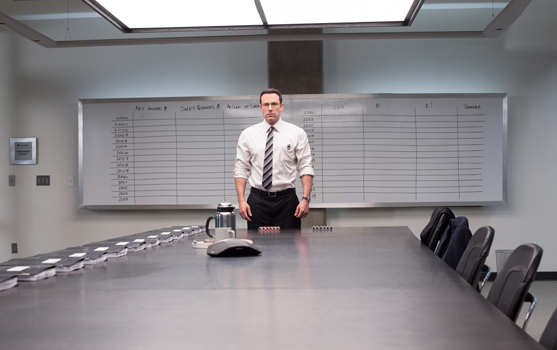Sooner or later, people fear different
Directed by: Gavin O’Connor
Written by: Bill Dubuque
Cast: Ben Affleck, Anna Kendrick, J.K. Simmons, Jon Bernthal, Cynthia Addai-Robinson
Swift shot: They finally found the perfect role for Ben Affleck, a flat affect mathematical genius devoid of passion. The Accountant is a puzzle itself, with the pieces strewn around for you to figure out who is holding all the secrets . . . and why. It is a well crafted thriller, to be sure. Only a few flaws made the story a bit unpolished. In reality, this is a story about how someone with a flaw finds a way to make that unique divergence an asset, with a little help from some careful, albeit misguided direction from someone that cares for him.
Young Christian Wolff (Seth Lee) is on the genius autism spectrum, he is unique and gifted but lacks the ability to make any real emotional connections, save for his family, his mother (Mary Kraft), father (Robert C. Treveiler), and little brother (Jake Presley). As he has gotten older, Christian’s parents come across a neurological institute that is willing to give him free residency if they can monitor him. It would be a comfortable life. But not everyone is on board with the idea; this leaves a tear in the family that is never mended, and it will forever haunt Christian and his little brother.
Now an adult who has learned to cope with his quirks, Christian (Affleck) has found a niche as an accountant. He specializes in un-cooking the books for some of the most deadly men on the planet, yet he operates completely off the radar . . . almost. One aged treasury agent, on his way out the door, Ray King (Simmons), has recruited his heir apparent, Medina (Addai-Robinson) to finally put a face to the boogeyman that keeps him up at night. King can’t stop wondering who this creature is, and when you see what he is willing to do to get the puzzle solved, you realize that a bit of Christian’s need for closure is driving him.
As the treasury department gets closer to discovering Christian, his only known friend (and business associate), an elusive British female on the other end of his cellphone, recommends he take on a legitimate client, a robotic firm helmed by Lamar Black (John Lithgow). Black is creating amazing prosthetics for people who have lost limbs, and he is a true visionary. Perhaps for this reason, or perhaps just because he likes solving puzzles, Christian takes the assignment and begins the audit of all audits.
Black’s sister (Jean Smart) has given the un-fun task of arranging fifteen years of ledgers to her employee Dana Cummings (Kendrick). As it happens, Dana is not that much different than Christian, she loves puzzles, and her favorite puzzle becomes Christian himself. There is something interesting about him, but as they get to the answer about who is taking the money, and why, things go from interesting to lethal in a matter of hours. The nice normal existence that Christian is trying to maintain crumbles as he realizes he needs to save Dana from some very nasty customers.
Enter Brax (Bernthal), a hired gun who is as adept with his weapons as he is with his mind. He is the guy I imagine when I think about #Arkancide, and how elite people make problems “go away” with some wet works. Brax is one of the most chilling characters you’ll ever meet. He is very to the point about what he does, and he doesn’t leave you much time to think about the choices he’s offering you. Brax has sent his men, at the behest of his employer, to take out the accountant and Dana. But Christian Wolff is no ordinary accountant, he’s also a trained killer with no moral compunctions about killing anyone who hurts the few people he lets get close. Now, Christian must protect Dana from a threat that is very close to home.
The Accountant is technically a thriller, but it doesn’t deliver non-stop thrills. It has slow moments, many of them in fact, but pieces of the puzzle are always being revealed if you pay attention closely. The flat tone of Affleck’s Christian works well within the confines of the script. He isn’t really expected to show much range, he is pragmatically driven, and the only cracks in his emotion are revealed behind closed doors and through his appreciation of art.
What really stands out is the family dynamic, the choices we make to be a victim or a hero . . . and what the impact of our choices can lead to. You’ll probably like the way the story evolves and the conclusion. What you might not like is how the villains operate and the question that remains about how much of a factor Christian’s genius really plays into the concept of his character.




